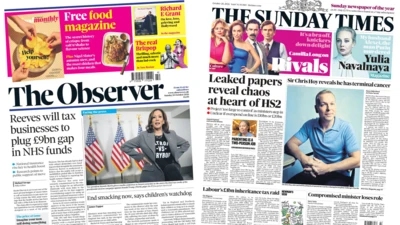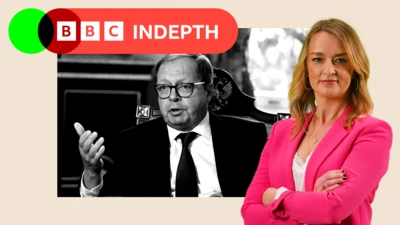We've updated our Privacy and Cookies Policy
We've made some important changes to our Privacy and Cookies Policy and we want you to know what this means for you and your data.
Brexit delay proves lesser evil for May
Image source, EPA
- Author, Laura Kuenssberg
- Role, Political editor
The request for delay is an answer to one question.
When confronted with the possibility of taking the UK out of the EU without a formal deal in place or slamming on the brakes, which way would the prime minister jump?
Would she choose a pure plan - pursuing Brexit over the risk of instability?
Or would Theresa May heed the voices of warning, rather than those in her own party arguing that any short-term pain would be worth long-term gain, and ask for delay, despite the embarrassment of doing so, and the frustration of those who wanted her to keep the promise of leaving on time?
Mrs May kept many in Westminster guessing for a long time.
But her meetings in Europe, her plea on Tuesday, are evidence of the decision she finally took - that almost any entreaties to European leaders are worth it to avoid opening Pandora's Box. Pausing again brings embarrassment and angers many on her own side, but it's a lesser evil than departing with no deal.
If the prime minister is granted a strings-attached delay later, the next question is perhaps as big.
What will she do with the extra time she's been granted? Will it even be up to her?
Cross-party talks with the Labour Party are serious - both sides in the room are taking part in good faith and expect more negotiations on Thursday.
But the more talking they do, the more the scale of the task to bring them together reveals itself.
Forget a quick solution from this joint process, and don't bank on one happening at all.
The divisions may simply be too great - the moment when it might have worked perhaps has passed.
If that fails, then the answer may pass again, back to Parliament - MPs confronted again with the power to choose from a wide array of different choices - with the ability, if not yet the common purpose to choose a version of Brexit for all of us.
And of course, if a long delay is agreed it could push hungry Tories who want a change of leadership again into action.
But the obvious response to another question is crystal clear - who is in charge for today?
It's the EU leaders who will determine the date and nature of this delay - not the country that voted in an effort to pull back control.
Top Stories
More to explore
Most read
Content is not available








